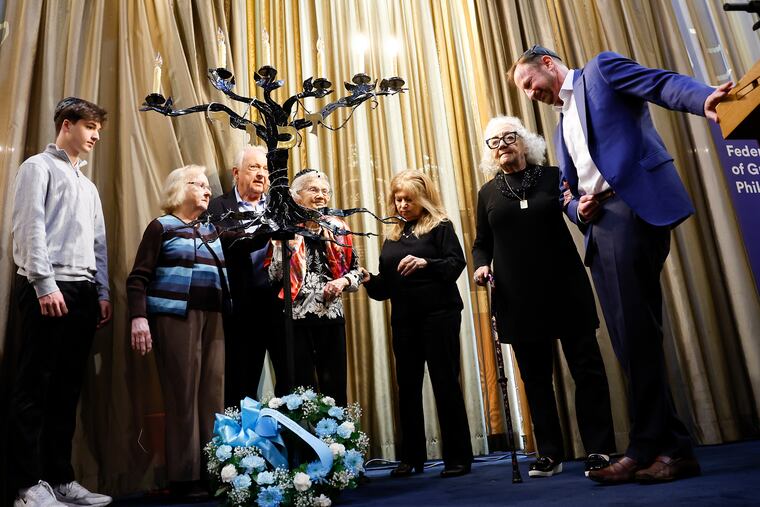‘You must never again be silent:’ Holocaust Remembrance Day ceremony has greater meaning this year amid Israel-Hamas war
Holocaust Remembrance Day ceremony has greater meaning this year amid Israel-Hamas war

Leaning on a cane with one hand and a man’s arm on the other, Ruth Brandspiegel gingerly made her way up to the podium Sunday at the Temple Beth Zion-Beth Israel synagogue near Rittenhouse Square to light a commemorative candle for the six million Jews who were killed in the Holocaust.
At 88, with a curly mop of gray hair and black-rimmed glasses, she was perhaps the youngest survivor to attend the Holocaust Remembrance Day ceremony at the synagogue. Children of survivors call her “the baby” of the group. An only child, she lost her grandparents, aunts and uncles and scores of family friends to the Nazis.
In some ways, Sunday was like every annual remembrance day. But this year, there was a heaviness in the air and a tone of urgency with a backdrop of the Israel-Hamas war and intense Pro-Palestinian protests on college campuses calling for a cease-fire and to divest from Israel.
“It’s more emotional today because I’m getting old,” Brandspiegel said. “But also it’s sad because of what I hear people are saying.” Brandspiegel was born in 1936 in Ciechanów, Poland. Her family escaped after Hitler’s invasion of Poland in 1939 and she was sent to a labor camp in Siberia. Her family later moved to Philadelphia in 1952.
Brandspiegel sat in the front row next to Elizabeth Zuckerman Bleiman, 102. She had been sent with her father and stepmother to the Kisvarda ghetto in Hungary where she became a nurse. She was later put on a train to Auschwitz, and then sent to a labor camp before it was liberated.
At Sunday’s event, State Sen. Sharif Street quoted a West African saying that he said is appropriate today: “In order for us to move forward, we must look back.”
“We must remember that before there were gas chambers, before people were rounded up, there were pamphlets and rhetoric that spread rumors and lies in antisemitic tropes,” he said. “There were elections and there was political organizing when people began to scapegoat the Jewish people. We must remember that the Holocaust didn’t just occur at the end when people were all rounded up and the atrocities that we talked most about occurred. We must remember that it was a gradual increase in rhetoric. There was a dehumanizing effect ... that they were “The Other.’
» READ MORE: Student protests over Gaza war are forcing Penn and other U.S. universities to face ‘impossible’ demands
“The rights didn’t just topple down all at once, but that they were withered away at over time,” he said.
Today, he said he sees a rise in antisemitism. “We must understand that we are seeing many of the early signs that led to the Holocaust. We are seeing the kinds of things and we must remember that it did not have to happen.”
People have to speak up when they hear hatred, he said. “Not just Jewish people, but all people who know it is wrong ... If we really believe never again, you must never again be silent.”
Michael Markman, board chair of the Jewish Federation of Greater Philadelphia, said, “For the past 60 years our community has shown up each year to say never again, to ensure that you never forget about those who perished.”
But these past seven months, he said, “have been tremendously challenging. Since October 7, we’ve seen an unprecedented spike in antisemitism locally and worldwide. This is starting to feel like 1933 Germany and if we sit and we do not fight, it will happen again and we cannot allow that.”
“Prior to Israel invading Gaza, these demonstrators hit our campuses, attacked our children and attacked us for being born Jews. This cannot happen. We must all fight together. Bigotry and racism cannot continue.”